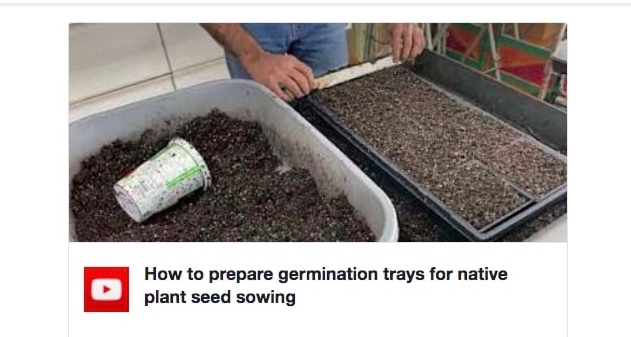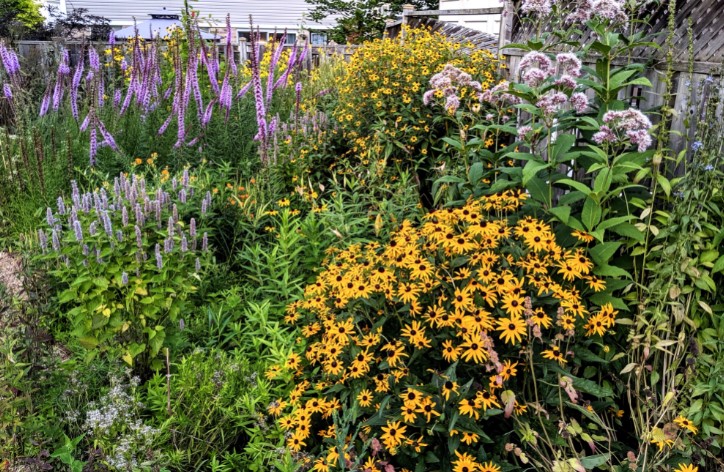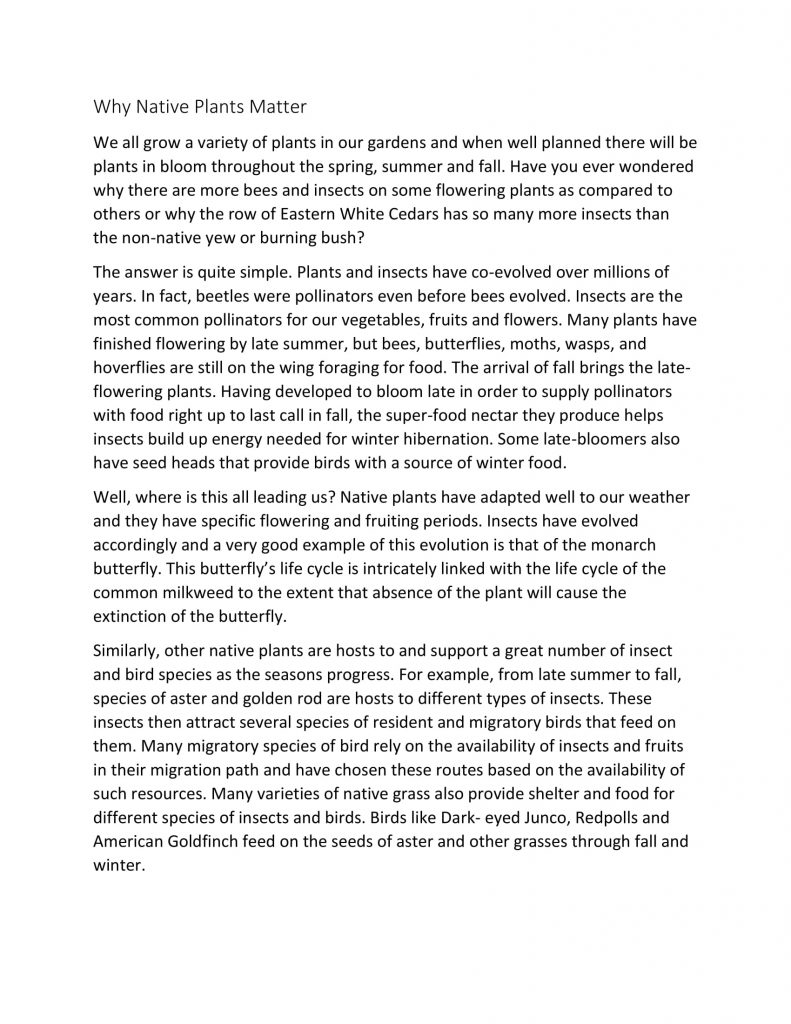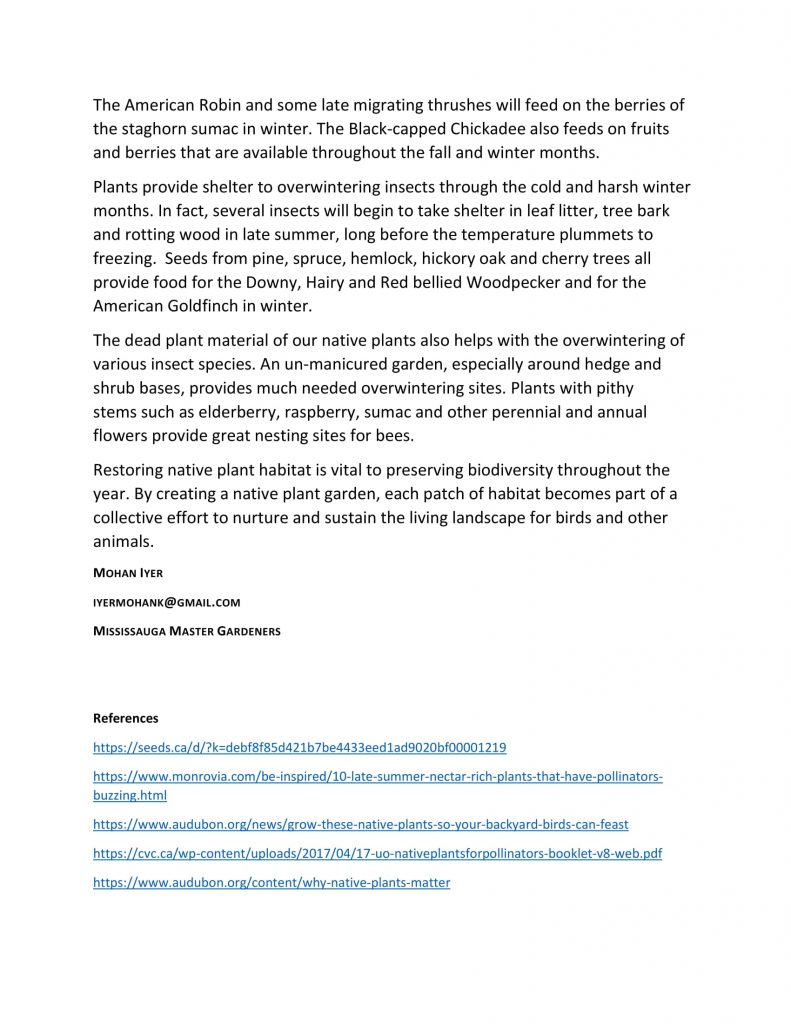
Gardening Advice
Want more native plants? Did you know: You can sow native plant seeds in winter!


Why Native Plants Matter



Garden Soil: What You Need to Know

What is (garden) Soil?
Soil is so much more than dirt. Soil is a living ecosystem— a large community of living organisms linked together through nutrient cycles and energy flows. Every teaspoon of soil is home to billions of microorganisms — bacteria, fungi, nematodes, insects, and earthworms that play important roles.
And trying to improve the health of your garden soil is not as complicated as some people suggest. Let’s look at some of the important soil components.
Good soil needs to have organic matter. Organic materials are carbon-based compounds used by gardeners to help their plants grow. This includes compost, green manure, leaf mold, and animal manure. If your soil is sandy or has heavy clay, organic matter improves the structure of the soil and hence helps with water drainage. Organic matter also feeds the soil with microorganisms and insects, creating a good environment for soil microbes which eventually enhances a plant’s health and growth. Soil that is rich in organic matter tends to be darker and crumbles off of the roots of plants you pull up. A healthy, spread-out root system is also a sign of good soil.
Soil pH is another important factor that needs to be taken into consideration. Soil pH is the acidity or alkalinity of your soil. It’s a scale that runs from 0 to 14. A pH of 7 is neutral and if the number decreases from 7, the acidity increases and if the number increases from 7, the alkalinity increases. Plant nutrients become available or unavailable according to the soil’s pH level. The essential nutrients are most available to most plants at a pH between 6 to 7.5. Soil pH can be measured and altered as per one’s requirements.
Water and air are also important for good soil health. Roots and microbes need varying amounts of water and air and the microenvironments in the soil help with this. Soil compaction and disturbance disturb this balance and hence it is important to minimize soil compaction.
So, the next time when you are in the garden center trying to figure out which bags of soil to pick for your vegetable or ornamental garden, remember that you already have soil in your garden. All you might need to do is take a closer look at it and try to identify what it is missing. Feel the soil. Smell it. Get your hands dirty. You have to understand your soil before you start growing plants in it. And trust me its not that difficult. I am not an expert and I did it, so can you!
Mohan Iyer
Mississauga Master Gardeners
References
JOE LAMP’L– www.growingagreenerworld.com
Lee Reich- www.finegardening.com
How does your garden grow? Peel residents are growing their own food during the pandemic
 Pandemic is providing an opportunity to build better connections with our food by creating edible gardens.
Pandemic is providing an opportunity to build better connections with our food by creating edible gardens.
Story from The Mississauga News includes an interview with our own MMG Michelle Wilson.
Our new COVID-19 world has changed the way we as a society live and consume. In just a few weeks since physical distancing and other health regulations were put in place, communities have quickly learned how to adapt and react.
One area that has been impacted most is food, leading to food insecurity.
Since the pandemic was declared nearly two months ago, food bank usage has increased, farmers are having to discard their produce due to closures of large customers like restaurants, and talks of food shortages are everyday occurrences.
But one “hobby” is emerging as a potential solution to our food woes. The interest in gardening and growing your own food has bloomed immensely.
“On multiple levels this is definitely a trend that has happened around the world,” said Joe Nasr, of Ryerson University’s Centre for Studies in Food Security and Toronto Urban Growers.
“People are concerned, and more exposure is making them think of the food and agriculture system in a more tangible way.”
Nasr believes there are multiple reasons behind the spike in amateur gardening.
Not only do more people have time of their hands, gardening can also be a therapeutic release during stressful times. Not to mention potential food shortages or how many people rely on community gardens — which were closed until recently — for their food supply.
“A shortage of food hasn’t happened yet, but it can easily happen. Food coming from Mexico to feed Canada is dependent on access to borders,” said Nasr.
For Jane Hayes of the Erin Mills Community Garden and Garden Jane, she believes this opportunity allows people to connect with memories of the past and cites victory gardens from the war.
“You’re essentially joining quite a big movement and that is reassuring,” she said.
She also lists giving people a sense of control, self-soothing and calmness as additional benefits of taking up gardening.
Michelle Wilson of the Master Gardeners Mississauga and Chinguacousy Garden Club believes the move to growing your own produce is the right step to self-sufficiency.
“We need to move away from ‘nice looking’ to having something to eat,” she said, explaining that aesthetically pleasing lawns and flower beds are not of such importance.
“These are trying times, if we get a second wave that (growing for aesthetics) is going to disappear, people do need to garden for themselves for security.”
Wilson has spent many years learning the do’s and don’ts of gardening and planting and has provided some tips for those experimenting with their green thumbs.
For the first time-gardener, it’s best to pick plants that are easiest to grow. Vegetables like radishes, herbs, lettuce, tomatoes, kale, swiss chard and squash are some that Wilson suggests.
Growing vegetables from plants instead of seeds is also suggested for beginners.
“Your garden area needs to have good drainage,” says Wilson, adding it will also need access to rain and good light, at least 6-8 hours of sunlight daily.
Enriched soils are better for growing conditions and Wilson suggests keeping your food waste to do the job. Crushed eggshells, coffee grounds and banana peels can be mixed in to create organic compost.
A tip that is often forgotten is giving your plants enough space, as Wilson explains, “a lot of times you get excited and plant too much.” Overcrowding will lead to the death of your plants.
If you don’t have access to garden space, Wilson suggests grabbing a pot and start experimenting.
“There’s no reason why we can’t grow things in pots,” says Wilson. “But they have to have deep roots.”
Beets, carrots, kale and swiss chard need pots large enough to home the growing roots, while herbs, lettuce and green onions can be grown in shallow containers.
Pots and containers will need to be placed in a sunny location to get their 6-8 hours of sun.
Wilson cautions that growing vegetables in containers above ground often dry out quickly and will need to be monitored during the warmer months.
In general, Wilson says to keep it simple — have fun and grow only what you will eat.
“Do not expect to learn everything all at once, there will be failure along with the success,” she said.
“This is key.”
For the meantime, there is no denying the impact of growing your own food, but will this practice continue after the pandemic is over? Both Wilson and Nasr hope the answer to that question is yes.
Hayes sees this moment as a chance to “learn how to improve our local food access and our relationship with foods, with farmers and with our fellow community members,” and hopes to see these relationships flourish in the future.
Miss Riverwood’s Webinar “Ask the Garden Experts”? Here’s a link to the video
Riverwood’s “Ask the Garden Experts” online webinar filled to capacity early on, so if you missed it, as we did, you might have been disappointed.
But, fortunately, Riverwood has posted the entire webinar to YouTube, where you can watch it at your leisure. Here is the link: Ask The Garden Experts Apr 23/2020
In this video, you will visit the spring garden of Douglas Markoff (Executive Director, The Riverwood Conservancy) and his wife Gail, pictured below in their greenhouse.
As well, we learn about soil health, growing vegetables, pruning shrubs, dividing perennials and more.
One particular plant that garnered a lot of interest from the participants is one of Douglas’ favorites:
Mukdenia rossii, a plant with multi-season interest. Learn more about mukdenia here:

EcoSource “Grown in Mississauga” Manual Available for Free Download

Learn how to grow fresh vegetables at home with this interactive step-by-step guide from EcoSource Canada.
Information on where to site your garden, soil heath, choosing which vegetables to plant, starting seeds, transplanting seedlings, garden maintenance and more. Specifically tailored to gardening in Mississauga, this pamplet is a treasure trove of useful help on planning and planting your #VictoryGarden2020.
Download your free copy HERE
City of Brampton’s Backyard Garden Program Announced
We congratulate Brampton on the new Backyard Garden Program for Brampton residents and we hope that other communities will follow the Flower City’s good example.
Mississauga Master Gardeners’ primary project for 2020 is to foster home vegetable gardens in the tradition of Victory Gardens during WWI & WWII. #VictoryGarden2020 is a way to engage with nature, provide food security, teach kids about gardening and nature, improve soil, benefit the environment and more.
Plus there is nothing like picking your own fresh vegetables just at their peak of ripeness…food doesn’t get more local (or tasty) than that.
Follow MMG posts for advice on what to plant and how to plant your Victory Garden 2020.
Here is more info on the Brampton initiative.
We hope that the City of Mississauga follows this example and creates a home vegetable garden program of our own! And other local communities can do the same.
Media Release
City of Brampton announces first citywide Backyard Garden Program in Canada in response to COVID-19
FOR IMMEDIATE RELEASE
BRAMPTON, ON (April 16, 2020) – Yesterday, the City of Brampton launched the Backyard Garden Program, a new eco-friendly initiative to help support food security in our city, and encourage residents to get active at home during the COVID-19 emergency. The City of Brampton is the first municipality in Canada to launch a citywide initiative to support residents in growing their own gardens in response to COVID-19.
The new Brampton Backyard Garden Program is chaired by City Councillor Doug Whillans, Wards 2 and 6, in partnership with the City’s Parks Maintenance and Forestry division, and will include community partners as required.
With physical distancing measures in effect, this program encourages residents to grow produce and herbs from the comfort of their own homes, and donate their homegrown crops to local food banks and community organizations. In order to ensure food is equally distributed to those in need, a request form will made available for food banks and organizations to complete.
This initiative supports the Mayor’s Social Support Task Force’s focus on food security and reaffirms the City’s priority of being a sustainable Green City.
The new Backyard Garden Program, through which residents can continue to stay active and green, is an extension of the existing Community Gardens program.
Residents can request free supplies (soil and seeds) by emailing BramptonGreenCity@brampton.ca. We will also share tutorials and tips on how to maintain gardens on our website at www.brampton.ca/parks.
With the 50th anniversary of Earth Day just around the corner (Wednesday, April 22), this is the perfect opportunity for residents to contribute to urban agriculture, give back to the community, and help Brampton become a more healthy, resilient, and environmentally sustainable city. Here are some tips to celebrate Earth Day at home. Read more
What is a Victory Garden? Why You Should Plant One in 2020

History of Victory Gardens:
Victory gardens, also called war gardens or food gardens for defense, were vegetable, fruit, and herb gardens planted at private residences and public parks in the United States, United Kingdom, Canada, Australia and Germany during World War I and World War II. In the war time, governments encouraged people to plant victory gardens not only to supplement their rations but also to boost morale.
George Washington Carver wrote an agricultural tract and promoted the idea of what he called a “Victory Garden”. They were used along with Rationing Stamps and Cards to reduce pressure on the public food supply. Besides indirectly aiding the war effort, these gardens were also considered a civil “morale booster” in that gardeners could feel empowered by their contribution of labor and rewarded by the produce grown. This made victory gardens a part of daily life on the home front.
Source: Wikipedia //en.wikipedia.org/wiki/Victory_garden
Victory Gardens 2020:
As we write this in March 2020, there is a global “war” being waged against a common enemy, COVID-19, the pandemic virus.
In these troubled times, gardening has a big part to play in the well-being of so many of us. Gardening is one of the few activities that is not cancelled, and it is a valuable outlet in these times of turmoil. But to get the most benefit from our gardens, perhaps we should turn to the practice of creating Victory Gardens once again, and grow some of our own food this season.
Growing your own food is important for so many reasons, with so many benefits:
- Food security: Agriculture will be impacted by COVID-19 in coming months and there will be disruptions and potential shortages of some fresh foods. By planting an edible garden, you’ll be providing your family with a steady supply.
- Fresh fruits and vegetables will likely increase in price. Your garden can even grow organic fruit and vegetables, which will save you money in the long run.
- Gardening is not cancelled! This fresh-air activity is therapeutic and can be practiced with safe outdoor social distancing, even if done in a community garden setting. Gardening improves morale in tough times, and, if you plant them, you get tomatoes!
- Gardening has benefits for the environment and your victory garden will help combat climate change.You can have an edible garden in any space, whether it is a collection of pots of fresh herbs on a windowsill, a grouping of containers on a deck or patio, or a full garden bed on your plot. We can show you how in our series of posts here and on twitter.
- Edible gardens are a great teaching tool for kids. Studies show that children are more likely to eat vegetables that they’ve had a hand in growing, so that is win-win as well! Now that kids are home from school, why not involve them in growing seeds and planting your edible garden?
- Nothing tastes better than the fresh produce that comes from your own garden, where you know exactly what has gone into the final product. And vegetables you grow yourself are likely more nutritious as well.
Follow our series of posts here on our website, on our MMG Facebook and on twitter @MississaugaMGs.
Over the next couple of months, we’ll be posting advice on how to get started, what to plant from seed now & later, how to transplant seedlings, edibles in containers, and more.
If we miss answering your question about #VictoryGarden2020, get in contact with us through our social media contacts or by email at
mississaugamgwebmaster@gmail.com
Mississauga Master Gardeners are here to help with gardening advice.
NB: Sorry, we can’t come over and plant the garden for you, even when social distancing ends!
Let’s #GetGrowing, Everybody!
 Pandemic is providing an opportunity to build better connections with our food by creating edible gardens.
Pandemic is providing an opportunity to build better connections with our food by creating edible gardens.